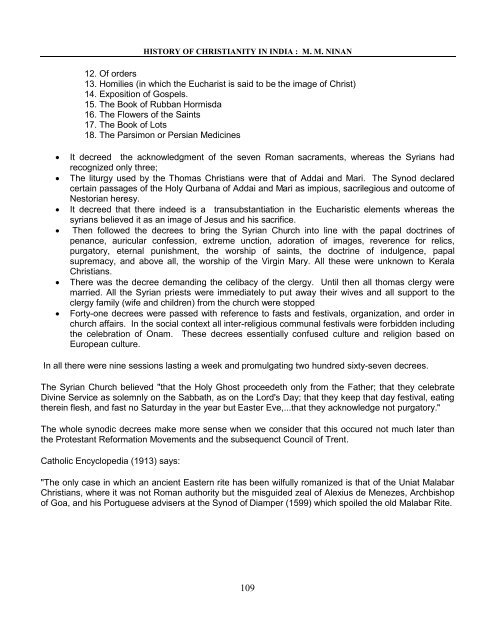Indian Christianity
You also want an ePaper? Increase the reach of your titles
YUMPU automatically turns print PDFs into web optimized ePapers that Google loves.
HISTORY OF CHRISTIANITY IN INDIA : M. M. NINAN<br />
12. Of orders<br />
13. Homilies (in which the Eucharist is said to be the image of Christ)<br />
14. Exposition of Gospels.<br />
15. The Book of Rubban Hormisda<br />
16. The Flowers of the Saints<br />
17. The Book of Lots<br />
18. The Parsimon or Persian Medicines<br />
• It decreed the acknowledgment of the seven Roman sacraments, whereas the Syrians had<br />
recognized only three;<br />
• The liturgy used by the Thomas Christians were that of Addai and Mari. The Synod declared<br />
certain passages of the Holy Qurbana of Addai and Mari as impious, sacrilegious and outcome of<br />
Nestorian heresy.<br />
• It decreed that there indeed is a transubstantiation in the Eucharistic elements whereas the<br />
syrians believed it as an image of Jesus and his sacrifice.<br />
• Then followed the decrees to bring the Syrian Church into line with the papal doctrines of<br />
penance, auricular confession, extreme unction, adoration of images, reverence for relics,<br />
purgatory, eternal punishment, the worship of saints, the doctrine of indulgence, papal<br />
supremacy, and above all, the worship of the Virgin Mary. All these were unknown to Kerala<br />
Christians.<br />
• There was the decree demanding the celibacy of the clergy. Until then all thomas clergy were<br />
married. All the Syrian priests were immediately to put away their wives and all support to the<br />
clergy family (wife and children) from the church were stopped<br />
• Forty-one decrees were passed with reference to fasts and festivals, organization, and order in<br />
church affairs. In the social context all inter-religious communal festivals were forbidden including<br />
the celebration of Onam. These decrees essentially confused culture and religion based on<br />
European culture.<br />
In all there were nine sessions lasting a week and promulgating two hundred sixty-seven decrees.<br />
The Syrian Church believed "that the Holy Ghost proceedeth only from the Father; that they celebrate<br />
Divine Service as solemnly on the Sabbath, as on the Lord's Day; that they keep that day festival, eating<br />
therein flesh, and fast no Saturday in the year but Easter Eve,...that they acknowledge not purgatory."<br />
The whole synodic decrees make more sense when we consider that this occured not much later than<br />
the Protestant Reformation Movements and the subsequenct Council of Trent.<br />
Catholic Encyclopedia (1913) says:<br />
"The only case in which an ancient Eastern rite has been wilfully romanized is that of the Uniat Malabar<br />
Christians, where it was not Roman authority but the misguided zeal of Alexius de Menezes, Archbishop<br />
of Goa, and his Portuguese advisers at the Synod of Diamper (1599) which spoiled the old Malabar Rite.<br />
109


















